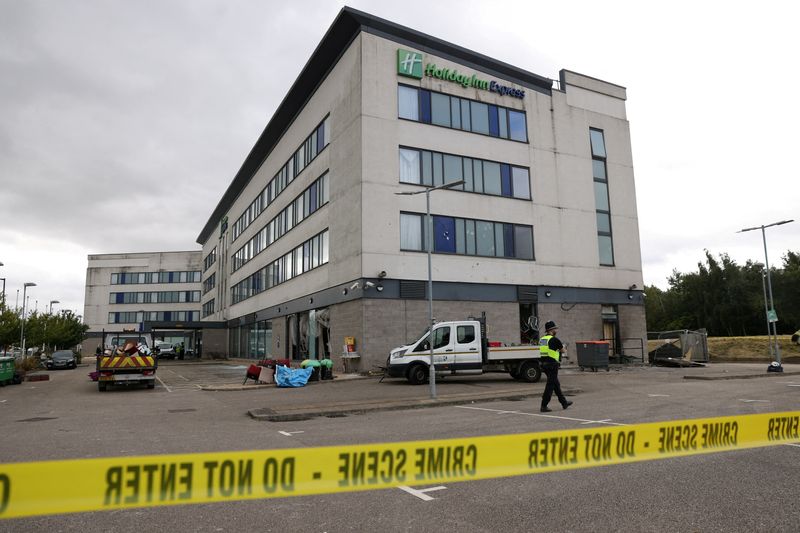By Sachin Ravikumar and Kate Holton
LIVERPOOL, England (Reuters) – Britain’s government has increased the capacity of its prisons to help deal with violent, week-long anti-Muslim riots that have prompted a growing number of countries to warn their citizens about the dangers of travelling to Britain.
Riots have erupted in several cities following the murder of three girls at a Taylor Swift-themed event in Southport, a coastal town in northern England, after fake social media posts mistakenly identified the alleged killer as an Islamist migrant.
The unrest spread, with rioters targeting mosques and smashing the windows of hotels housing asylum seekers from Africa and the Middle East, chanting “Get them out,” in the first large-scale outbreak of violence in Britain for 13 years.
They also threw stones at mosques, unverified videos posted online showed ethnic minorities being beaten, and a man photographed at a protest in Sunderland on Friday had a swastika tattooed on his back.
“My message to anyone who chooses to take part in this violence and violence is simple: the police, courts and prisons are ready and you will have to face the consequences of your abhorrent acts,” said Justice Secretary Shabana Mahmood.
The Justice Department, which is expected to release some prisoners early as it battles a prison overcrowding crisis, said it has secured about 600 prison spaces to house those involved in violence. About 400 people have been arrested so far.
The unrest has prompted India, Australia, Nigeria and other countries to urge their citizens to remain vigilant.
Saminata Bangura, a 52-year-old social worker at a care home in Liverpool, northern England, said she had felt so welcome in Britain after moving from Sierra Leone. But now she was scared and mostly stayed at home.
“I’m so scared, even when I walk, because everywhere we are scared, especially us black people,” she said, describing the vandalism of a library near where she lives.
RACIAL HATRED
Prime Minister Keir Starmer has promised to hold to account those who fomented riots, threw bricks at police and counter-protesters, looted shops and torched cars.
Police on Tuesday charged a 28-year-old man with inciting racial hatred for Facebook (NASDAQ:) posts related to the riot. A 14-year-old pleaded guilty to violent disorder.
On Monday night, riots broke out in Plymouth, southern England, and then again in Belfast, Northern Ireland, where hundreds of rioters threw petrol bombs and heavy brick blocks at officers and set fire to a police Land Rover.
Online messages say immigration centers and law firms that assist migrants will be targeted on Wednesday, prompting anti-fascist groups to say they will thwart any demonstrations.
Police believe the violence is caused by online misinformation, amplified by high-profile figures.
Stephen Yaxley-Lennon, known by the pseudonym Tommy Robinson and former leader of the defunct English Defence League, an anti-Islam movement, has long attacked Britain’s policy of welcoming asylum seekers arriving in the country.
At the end of December 2023, there were 111,132 people receiving asylum support in Britain, with 45,768 people in hotels. During that year, the government’s Office for Statistics estimates that net migration into the country was 685,000.
Experts on extremism and social cohesion say far-right agitators have exploited the Southport killings to foment violence.
Sunder Katwala, director of the migration and identity think-tank British Future, said the killings had been used “to mobilise against asylum seekers and Muslims in particular, and this has continued despite evidence showing that the person in question is neither an asylum seeker nor a Muslim”.
Police said the attack was not terrorist-related and that the suspect was born in Britain. Media reported that the suspect’s parents moved to Britain from Rwanda.
In Birmingham, Britain’s second largest city, videos were released on Monday showing Asian men gathering with Palestinian flags, following reports that the area could be targeted by anti-Muslim protesters.
Journalists at the scene said they were greeted with hostility and some videos appeared to show a white man being attacked in a pub.

The prospect of clashes between ethnic and white minority groups revived memories of the race riots that broke out in Oldham and other towns in northern England in 2001, which an official report later blamed on a lack of social cohesion, with two communities living parallel lives.
A poll by YouGov on Tuesday found that three-quarters of respondents said the rioters did not represent the views of Britain as a whole, while 7% said they supported the violence.





